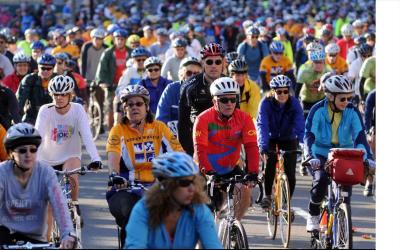
Hub on Wheels bike ride
One thing that Boston, Kansas City, Midland, Michigan, Salisbury, North Carolina and Oahu all have in common — they want to be considered bicycle-friendly communities.
Putting a label on communities' efforts to achieve accessibility for bicyclists gives them a goal of making it to the League of American Bicyclists honored list. If successful, it also means fewer cars on the road and cleaner air.
The New York Times reported over the weekend on Boston's efforts (“Boston tries to shed longtime reputation as cyclists' minefield”).
Remember the city appearing on a “worst cities to bike” list in Bicycling magazine a few years ago? The city is trying to improve that image, and hired Nicole Freedman, a former Olympic cyclist, as the city’s “bike czar” in 2007 to accomplish that.
Mayor bikes around
What sparked the efforts? The Times says Mayor Thomas M. Menino got hooked on bicycle riding about four years ago. He shares his enthusiasm with the electorate through the Boston Cycling Celebration (Sept. 26 and 27) which includes a recreational ride (Hub on Wheels) and a race (Mayor's Cup).
Progress is slow, however. Since 2007, 4 miles of bike lanes have been installed, and 5 to 10 more miles are scheduled this year. The slow pace of bike lanes is attributed to the fact that Boston is an old city with narrow streets.
Other improvements: some 500 bicycle racks are to be posted this year and trails along the Charles River are being repaved.
Kansas City
Another big city that's trying to shed its anti-bicycling image is Kansas City, Missouri. It's so difficult to get around by bicycle there that the US Census counted just 50 people who commute to work everyday — this in a city of nearly half a million people.
The National Public Radio station in Kansas City, KCUR-FM, reports that Mayor Mark Funkhouser wants to change that. The city hired Deb Ridgway as bicycle and pedestrian coordinator, and she has proposed to City County adding 200 miles of bike lanes and 50 miles of bike trails by February 2012.
The network of bike routes, lanes and trails is competing with other, non-bicycling, projects for federal stimulus money. Funkhouser says bicycle are his priority, however, because:
“For short trips of two or three miles to the grocery store, we ought not be firing up the SUV.”
Efforts in other communities
Midland, Michigan — Pop. 40,000. MLive.com reports the city's leaders recently endorsed an advisory group's plan for improving the bikeability of Midland, but are worried about the pricetag — $5.5 million for multi-use paths, $230,000 for bike lanes, and $50,000 to mark designated bike routes. Supporters the cost is worth it: cities with extensive plans for non-motorized transportation always make the “most liveable” lists in national surveys. That would certainly help Midland's business climate.
Oahu, Hawaii — Pop. 900,000. You wouldn't think that Oahu would be concerned about making a “most liveable” list, but officials there are seeking to make the island more safe and accessible to bicyclists. The island recently completed bicycle plan adopted the League of American Bicyclists' five goals in grading bicycle friendly cities: Encouragement, Engineering, Education, Enforcement, Evaluation. The Oahu plan, which can been reviewed here, calls for bike routes, lanes, and paths in an island-wide network of some 700 miles of bikeways.
Salisbury, North Carolina — Pop. 27,000. This town used a $45,500 state grant to create a bicycle plan (available here) that calls for, among other things, creation of six bicycle loops around town. The lead consultant cautioned that such a plan could take up to 10 years to implement. He told the SalisburyPost, however, that he was surprised at the strong support citizens showed for providing bicycle lanes.
Bicycle unfriendly
While some cities and towns are willingly adopting bicycle friendly policies, in many other places, bicyclists have to pressure public officials into providing safe access to streets.
The AP reports on efforts in New Mexico, Connecticut, Indiana, Kansas, Michigan to implement “complete streets” programs.
And the League of American Bicyclists tells about verbal attacks of bicyclists by Detroit radio station WCSX.

Recent Comments